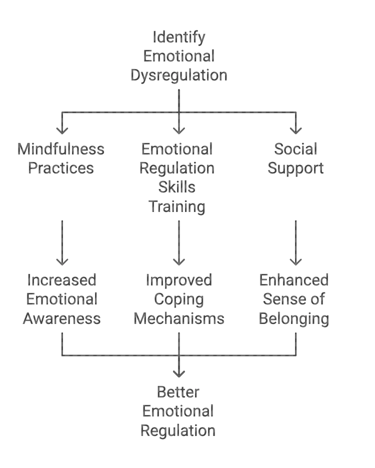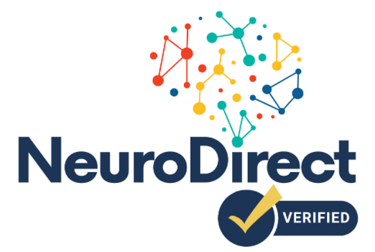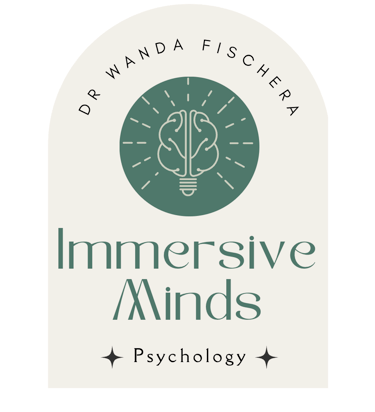Understanding ADHD Series 4: The Emotional Rollercoaster of ADHD
This blog post is about managing and understanding emotions when someone has ADHD.
ADHDINFOGRAPHIC
1/1/20252 min read


ADHD is often associated with hyperactivity and inattention, but it also has a significant impact on emotional regulation. Individuals with ADHD can experience heightened emotional responses and may struggle to manage their emotions effectively. This can lead to:
Emotional Dysregulation: Difficulty managing emotions, leading to sudden mood swings or intense reactions. Research suggests that individuals with ADHD may have differences in brain regions associated with emotional processing, which can contribute to difficulties in regulating emotions. This can manifest as:
Intense emotional reactions: Feeling overwhelmed, easily frustrated, or experiencing intense bouts of anger or sadness.
Difficulty identifying and labeling emotions: Struggling to understand and name their own emotions or the emotions of others.
Challenges with emotional expression: Difficulty expressing emotions in a healthy and appropriate manner.
Difficulty noticing signs of bodily functions: Individuals with ADHD may have difficulty recognizing and interpreting physical cues associated with emotions, such as increased heart rate, sweating, or muscle tension. This can make it harder to identify and manage emotional states.
Rejection Sensitivity: Increased sensitivity to perceived criticism or rejection, which can affect self-esteem and relationships. Individuals with ADHD may be more prone to interpreting neutral or even positive feedback as negative or critical. This can lead to:
Fear of failure: Avoiding challenges or new experiences due to a fear of rejection or criticism.
Social anxiety: Anxiety about social interactions due to a fear of being judged or rejected.
Relationship difficulties: Struggling to maintain relationships due to hypersensitivity to perceived criticism or rejection from partners, friends, or family.
Recognizing Overwhelm and Underwhelm:
Individuals with ADHD can sometimes have difficulty recognizing when they are feeling overwhelmed or underwhelmed. Overwhelm can manifest as:
Anxiety and stress: Feeling overwhelmed by tasks, responsibilities, or social situations.
Racing thoughts: Difficulty focusing and concentrating due to a constant stream of thoughts.
Physical symptoms: Headaches, stomachaches, or difficulty sleeping, developing chronic pain.
Underwhelm, on the other hand, can present as:
Boredom and apathy: Lack of motivation and interest in activities.
Procrastination: Putting off tasks due to a lack of motivation or feeling overwhelmed by them.
Difficulty concentrating: Struggling to focus due to a lack of stimulation or interest.
Recognising these states is crucial for managing emotions and seeking appropriate support when needed.
Here are three tips for managing emotional dysregulation in ADHD:
Mindfulness Practices: Mindfulness techniques such as meditation and deep breathing can help individuals with ADHD become more aware of their emotions and develop skills for managing them. Practicing mindfulness can also help individuals become more attuned to their bodily sensations and recognize when they are starting to feel overwhelmed or underwhelmed.
Emotional Regulation Skills Training: Cognitive-behavioral therapy (CBT) techniques can teach individuals with ADHD to identify and challenge negative thought patterns, develop healthy coping mechanisms, and improve emotional regulation. This can include techniques such as deep breathing exercises, grounding exercises, and visualisation.
Social Support: Building strong relationships with supportive family and friends can provide a sense of belonging and acceptance, reducing feelings of isolation and rejection. Sharing your experiences with others who understand ADHD can also be helpful and validating.
Remember: If you are struggling with emotional regulation or other challenges related to ADHD, seeking professional help from a psychologist can be beneficial. They can provide personalized strategies and support to help you manage your emotions and improve your overall well-being.
If you would like to learn more about how to manage the challenges of ADHD, please schedule a free 15-minute introductory call with me.


Support
Dr Wanda Fischera is offering personalised online therapy for individuals and groups. Registered with HCPC.
Connect & receive updates on services and free resources
© 2024. All rights reserved. By Dr Wanda Fischera
I respect your privacy and I will not pass on your details to third parties.




